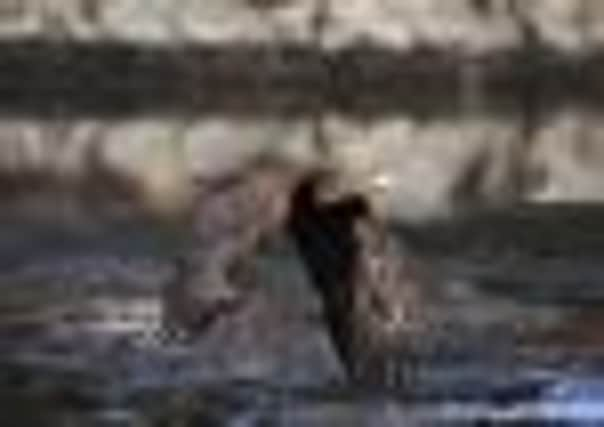‘Nature tourism can claw us out recession’


The Royal Society for the Protection of Birds (RSPB) report highlighted that the natural environment generates £17.2 billion for the Scottish economy and supports 242,000 jobs.
Nature tourism alone brings in £1.4bn spending each year in Scotland and supports 39,000 jobs, according to the report Natural Foundations: Conservation and local employment in the UK.
Advertisement
Hide AdAdvertisement
Hide AdMartin Harper, director of conservation at RSPB, said conserving the natural world will be key to future economic prosperity.
He said: “Our growing understanding of the vast and varied benefits of the natural world comes at a time of fiscal austerity, when we are already faced with a conservation finance shortfall in the UK of over £275 million a year.
“It also comes at a time when we are acutely aware of our failure to achieve our global ambitions to halt biodiversity loss.
“The main lesson of the twin economic and environmental crisis we face must be that we need a new approach to economic development and prosperity.”
He said this new approach must have the potential to deliver “sustainable prosperity over the long term”.
“We cannot do that without greening our economy and we can’t green our economy without conserving the natural world,” he said.
“Happily, as this report demonstrates, conservation is a contributor, not a barrier, to economic prosperity.”
RSPB has more than 200 nature reserves across the UK, covering more than 140,000 hectares.
Advertisement
Hide AdAdvertisement
Hide AdThe new report calculates they attracted £66m into the surrounding communities in 2009, supporting 1,872 local jobs.
Not only do they boost the number of visitors to pubs, hotels and restaurants, they create direct jobs on the reserves and support local industry in the construction of visitor facilities.
The report said: “These benefits are more often than not located in more remote, rural or coastal areas, where economic opportunities tend to be fewer and less diverse.”
Several species are highlighted in the report as particularly valuable to the Scottish economy, including the white-tailed sea eagle. Reintroducing the giant bird of prey to Scotland has proved controversial, particularly among farmers who claim they attack sheep, but the RSPB argues they support 150 jobs on Mull and Skye through tourism.
They also attract hundreds of thousands of visitors to the islands each year, who spend millions of pounds in the local area.
Similarly, in Dumfries and Galloway, the report highlights that 20 local jobs were supported in 2009 by tourists flocking to see red kites at the Galloway Kite Trail.
And the report highlights the value of RSPB’s reserves across the UK, including the Mull of Galloway reserve in Dumfries and Galloway, which attracts 20,000 visitors a year, who spend £2.8m in the local area.
“We believe this research adds to the existing welter of evidence on the need to have the natural environment at the heart of any green economic strategy,” added Mr Harper.
Advertisement
Hide AdAdvertisement
Hide AdHowever, Tony King, head of policy at the Scottish Wildlife Trust, said he did not think the Scottish Government had recognised the benefit of the natural environment to the economy in its draft 2012 budget.
“There is no recognition of the vital role of a high quality natural environment in wealth generation,” he said. “Spending on the environment is a real spend to save area.”
He described the draft budget as “bad news for wildlife” because it slashes the Rural Affairs and Environment budget by 5 per cent over the next five years.In its response to a consultation on the draft 2012 budget, the Scottish Wildlife Trust said: “A high quality environment is a key socio-economic asset for Scotland.
“It is vital to people’s quality of life, Scotland’s competitive advantage and identity and attracts inward investment and entrepreneurial talent.
“A reduction in investment in the quality and biological diversity of Scotland’s natural environment risks damaging society and the economy as well as Scotland’s international reputation.”
Dr Richard Dixon, director of WWF Scotland, agreed protecting the environment was crucial to future economic stability.
“In many cases it’s the environment which underlines our economic prosperity,” he said. “Whether it’s having healthy people or the resources to run industry it’s a good environment that’s required.”
He contrasted Scotland’s situation to China’s, where he said they were “using up the environment for short term economic gain”.
Advertisement
Hide AdAdvertisement
Hide AdIn contrast, he said in Scotland it should be possible to “sustain the environment while having a healthy economy”.
He believes there are “some promising signs” from the Scottish Government, but added that more needed to be done to protect the environment, such as promoting cycling and walking instead of spending large amounts of money on new motorways, and cleaning up air quality in Glasgow.
A spokesperson for the Scottish Government said:
“Stringent budget cuts from Westminster have resulted in a very tight budget settlement for Scotland. The Scottish Government is confident we have maintained our focus on priority areas and have delivered a budget that will continue to enable rural Scotland and our environment to flourish.